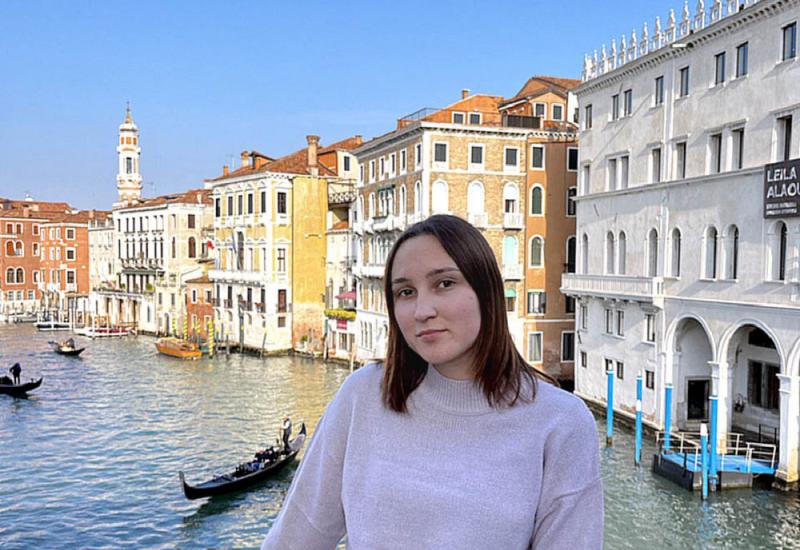"Academic mobility is one of the priority directions of the university's activities with the aim of deepening the internationalization and integration of the university into the Ukrainian and international educational and scientific space, improving the quality of education and the effectiveness of scientific research, as well as ensuring competitiveness in the market of educational services" (from the Regulation on academic mobility of the Igor Sikorsky Kyiv Polytechnic Institute).
Despite the difficulties of wartime, the Igor Sikorsky Kyiv Polytechnic Institute provides a full-fledged educational process in all its components. In particular, educational and scientific exchanges and internships are ongoing. "Students, post graduate students and lecturers of the Electronic Engineering Department continue taking an active part in international academic mobility programmes, which have become an integral part of modern education, says Professor Volodymyr Timofeyev, the head of the Electronic Engineering Department of the Faculty of Electronics. - Last semester, Dariia Kuzminska, our fourth-year student, studied at the Italian university Universita Degli Studi di Palermo within the Erasmus+ programme".
The editors of "KP" asked the student about her impressions of studying abroad.
- Before talking about the internship, please share how to get into the international programme?
- I study in the specialty "Micro- and nanosystem engineering". For a long time I wanted to feel what it was like to study abroad. To get into the programme, you should follow the news of the Academic Mobility Office of the Igor Sikorsky Kyiv Polytechnic Institute. Programme terms may vary. Having chosen the option that you liked the most, you need to receive an invitation letter from the receiving partner university and prepare a Learning Agreement. Next, an individual study plan is approved for the participants of academic mobility. After the end of the programme, the commission determines whether the student has successfully mastered the course while studying in the mobility programme.
- Does the educational process at the Italian university differ from the one we are used to at the Igor Sikorsky Kyiv Polytechnic Institute?
- At the University of Palermo, I studied subjects similar to my major. The laboratories there had a lot of new equipment compared to the equipment at the Igor Sikorsky Kyiv Polytechnic Institute. But I like the library at the Igor Sikorsky Kyiv Polytechnic Institute more than in Palermo.
I was really impressed by the work of volunteers who organize events and trips within the Erasmus+ programme. Thanks to them, I was able to find like-minded people, travel together with them in Italy and integrate into the university educational process without any problems.
- How was the training?
- This fall, I was lucky enough to get into the first offline semester after quarantine. Unlike the Igor Sikorsky Kyiv Polytechnic Institute, at the University of Palermo, most of the material is presented in lectures in the senior undergraduate and master's courses. This has its own logic, but I'm more used to studying using the Igor Sikorsky Kyiv Polytechnic Institute method, since it was in practical and laboratory classes that I understood better how what worked and where it could be used. But thanks to another method, I realized the value of theory better, learned to perceive it faster, in order to make fewer mistakes in practice and get results more quickly. It was a very cool experience to understand how students study in other countries.
- Italy is a beautiful, tasty and diverse country. What impressed you most about the Italians?
- Sicily is quite different from northern Italy. Here the pace of life is slower, people enjoy the moments and are in no hurry. At first, I was getting used to it for a long time. I was lucky to come here in the autumn semester, when golden and cool autumn was already prevailing in Ukraine, and there were still warm days here, as if the summer did not end. It was a good time to visit many interesting places in Sicily, even Mount Etna.
- And did you learn to understand the temperamental, but leisurely Italians?
- During my stay here, I started learning Italian, since I was not familiar with this language at all. A great opportunity to learn a new language immediately with native speakers.
- So, the impressions are only positive, aren’t they?
- Yes, I am very glad to have the opportunity to participate in the Erasmus+ programme and gain new experience of living and studying in another country.
- And to top it all, what would you advise students who are still hesitating to take the risk of testing their English and trying themselves as a student of a foreign university?
- In general, the mobility programme allows you to expand horizons of your ideas and interests, compare studies in different countries, travel a lot, and meet a large number of people. Just imagine: one evening you can gather with people from no less than 10 countries of the world. And everyone has their own worldview and interesting experience that you share with each other.
In conclusion, I want to thank my teachers and the Igor Sikorsky Kyiv Polytechnic Institute, who not only provide current knowledge, but also the opportunity to travel, learn about the world, and convey information about Ukraine.
Living and working during the war is a difficult science. The university that provides its students with quality education, the opportunity to create and dream, and work for the development and victory of Ukraine deserves all the more respect.

